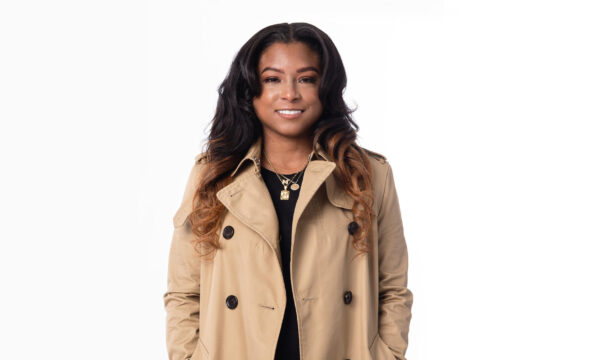
The Wren top, Lane skirt, Hugo necklace, and Claressa earrings.
An Overachiever’s Guide to Letting Go
2020 was tough for women who like to do it all. Here’s how to make 2021 a little gentler.
At the start of 2020, Debbie-jean Lemonte, 33, was looking at a very busy year. Lemonte, a photographer, had 60 weddings lined up. As a freelancer, she served many roles behind the scenes as an entrepreneur, sometimes playing accountant, assistant, bookkeeper, and then some; she was a “headstrong overachiever type” (as she refers to herself), working hard to grow her business.
Then the pandemic struck. Ninety percent of the weddings Lemonte lined up had to be rescheduled. “It was almost like a shock to my entire system,” says Lemonte. “Everyone was just completely pivoting, and I’m just sitting here, like ‘is this really happening?’”
With her bookings shifted virtually overnight, Lemonte’s routine was upended. Her daily schedule had revolved around delivering photographs and fielding emails for shoots, but those weren’t happening anymore. With work on hold, the entire structure for the year ahead was gone.
“What am I supposed to be doing?” Lemonte recalls asking herself.
For those who draw self-worth from checking tasks off our to-do lists, the pandemic has left us struggling through disrupted routines, altered work, and self-criticism for falling behind on our output. For women, people of color, and individuals from marginalized communities, the need to overachieve can also come from internalizing external discrimination, such as racism and sexism, being held to a higher standard, and achieving to prove that “I am worthy of being in this space,” according to Sepideh Saremi, a psychotherapist and executive coach who works with high achievers.
I’ve felt this acutely as a woman who falls into the overachieving category myself. I’m an LGBTQ+ journalist who often covers stories that have high stakes for my community, and my ability to do this work (and a high volume of it) is part of my identity. When the show I hosted was canceled this spring due to the pandemic, there was no amount of hard work or will that could change the circumstances. It was out of my control—and that made me feel helpless.
Looking at 2021, it’s tempting to think of a new year as an opportunity to overcompensate for the awfulness of the last. With Covid surging and bills piling up, however, overachievers should be thinking about taking the pressure off our self-judgement. And by understanding the compensatory place where our need to achieve comes from, we can set expectations to help carry us through what’s ahead. Here’s how the experts recommend letting go of our need to overachieve.

The Lasha top.
Accept the Circumstances, and Find a Path Forward
In her work with patients, Saremi tries to help overachievers move into the category of high performers, who are less likely to base their sense of self on documenting every achievement, and more likely see failure as an opportunity for learning, rather than a reason to feel bad about themselves.
At the beginning of the pandemic, Saremi says she predicted that her overachieving clients would “freak out” and recommended that they try to use the changes of the year to let go of their perfectionism.
“They have learned that even without working at 110%, nothing is going to fall apart,” says Saremi.
If we’re feeling grief from all that has happened this year—between the pandemic, police brutality, and political polarization—we can accept what has changed outside of our control, which will in turn enable us to focus on restoration. “Try to lean into looking forward and finding some sense of hope in becoming somebody new in your loss,” says Dr. Sonya Lott, a psychologist who specializes in traumatic and prolonged grief.

The Gaia jacket.
Set Meaningful, and Realistic Goals
For those who get gratification from their professional accomplishments (like me), it’s important to set goals that are meaningful beyond how they appear to others. We should ask ourselves why we really want to accomplish something and what we want to get out of it.
“Are you coming from a place of trying to overcompensate and prove your worthiness? If you are, then you can reconfigure that,” Saremi says. “The way that you do that is by really thinking about what matters to you and why, which we’ve all had a lot of time to do, and then aligning your goals with that.” You may find that when looking through this lens, some “goals” end up falling off your to-do list.

The Gaia jacket and Shiloh pants.
Have a Daily Routine That Helps You Feel Productive
On a more concrete level, if you’re still fortunate to be working and privileged enough to work from home, you can rebuild a routine that parallels your life before the pandemic. This is especially important for overachieving women and individuals with young children, who are facing more distraction and interruption as they’re tasked with child care, according to Racheal Cook, a business strategist and consultant.
For example, if you were used to exercising in the morning before the pandemic, you can still go for a walk to start the day. If you were used to commuting, you can create a devoted space in your home—even just the corner of the bedroom—where you always do work. By scheduling specific activities on certain days—like doing laundry every Monday, Facetiming with a friend every Tuesday, and having a family dinner every Wednesday—you can also avoid the feeling of Groundhog Day by creating structure over longer stretches of time, Cook says.

The Porter jacket and Claressa earrings.
Want more M Dash?
Sign up for our weekly newsletter.
Thank you!
Make Small but Powerful Changes
While I’m personally planning on being more inquisitive about my own motivation for burning myself out with work, I’m going to focus on small but obtainable changes in 2021. According to Saremi, overachievers often self-neglect—we overlook our physical well-being in pursuit of our goals. Trite as it may be, just making sure we drink enough water, eat when hungry, get enough sleep, and exercise regularly can be foundational to helping our mental health.
Similarly, Lemonte is changing her expectations by taking on other freelance jobs, like food photography, and finding innovative ways to work with clients from a distance. She’s thinking about the heart of why her work as a wedding photographer is meaningful in the first place.
“It’s no longer about being flashy. Weddings aren’t going to be about 500 people showing up to celebrate with you anymore,” Lemonte says. “It’s really going to come back to the simplicity and the importance of understanding what that day is about.” And at this stage of the pandemic, recognizing and appreciating simplicity is an achievement in itself.











